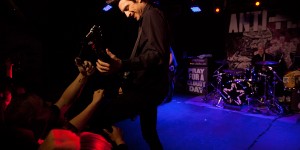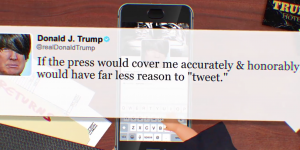Donald Trump is a problem punk rock can't solve
by Luke Ottenhof
November 14, 2016
Punk rock can't save us from Trump. It can't even save itself.
Donald Trump, that dude who bragged about sexually assaulting women and encouraged assaulting peaceful protesters, has just been elected President of the United States of America. He has selected an anti-Semitic white supremacist as a key advisor on his staff. He’s just announced he intends to deport or jail between two and three million immigrants immediately. He plans to build some form of impediment between the US and Mexico. And some people are whistling, “Wow, I bet punk is going to get so great.”
Imagine having the luxury of thinking about music at a time like this.
The only people with the luxury of focusing on music right now are people not threatened by these changes: cis white dudes. Ironically, they’re the ones who pretty much dominate the punk sphere. And if everything Trump promised comes to pass, white dudes will be the only ones left to make punk music. If you think this sounds alarmist, you need to check the score.
Kim Kelly recently tackled this issue for NOISEY in a great article that suggests steps to skirt this preposterous “music will be great” sentiment. The idea that punk might help us through this comes from the genre’s traditionally political and marginalized characterizations, and its apparatus as a catalyst for alternative views and anti-government sentiments. And while one can admit its’ utility as a comfort-blanket, there’s more to be done than listening to Rage Against the Machine records. As Kelly suggests: write your songs, celebrate music, do whatever; but then make some concrete changes and take some actual, tangible actions to enact what you’re singing about. But as listeners, one thing we should be cognizant of is that the majority of punk artists are white dudes. The simple fact is, POC, women, LGBTQ, or other minorities involved in punk music don’t always get their fair shake. Popularly, punk is not an intersectional space.
Bad Brains are a rare example of POC having a position in punk’s history, and they fucking hated gay people.
The band’s violent homophobia is well-documented in Brock Ruggles’ book, Not So Quiet On the Western Front: Punk Politics During the Conservative Ascendency in the United States. He quotes an interview with Bad Brains singer H.R. (which stands for ‘human rights,’ lmao) about a show in San Francisco, where H.R. stated that the way gay people acted made him “want to go and shoot one of them.”

G.L.O.S.S. were wonderful and staunch defenders of diversity and safe spaces in hardcore and punk for LGBTQ communities, and they just disbanded after turning down a $50,000 offer from Epitaph. No wonder they don’t feel safe or healthy on a more popular platform, when Bad Brains are still being celebrated by people like Dave fucking Grohl.
The point is that, historically, punk isn’t a singularly reliable venue for protest, nor a safe space for protesters. For white dudes, sure – it is. For women, for people of colour, for LGBTQ peoples, it’s pretty fucking dicey. NOFX-owned Fat Wreck can release great Trump-bashing t-shirts and donate the proceeds to charity, but they’re also the ones who put accused rapist Bill Cosby on their backstage passes.
As Jessica Hopper articulated for MTV, the whole ‘silver lining myth’ of music being ‘better’ under Trump isn’t simply a rosy sentiment or a lame joke; “it’s indifference to the plight of other people, and ignorance of the many ways a Trump presidency threatens to ruin lives — which is how we got into this fucking mess in the first place.”
Don’t romanticize periods of persecution, pain, and fear by valourizing the music that comes out of them. Don’t ascribe a narrative to it. Generally, if you’re doing this, you’ve never been on the losing side of these historical shifts. The great protest songs arose not out of comfort or excitement, but more often than not, at fucking gunpoint. They were an ugly necessity; we shouldn’t look forward to having great political protest songs. They’re not a giddy novelty. They’re a survival mechanism.
Why can’t other forms of music be protest-worthy? Calling any music that has a political tilt to it ‘punk’ is a nice way of minimizing an experience, removing it from its marginalized identities, and placing it squarely in a venue largely inhabited by white people. Punk doesn’t have an exclusive claim to political affiliations; hip-hop emerged under equally contentious circumstances and with just as important a message, if not more so. It makes no sense to say “Run The Jewels are so punk;” all that’s effectively doing is delegitimizing hip-hop as a form of concrete political engagement. If we can only understand these forms of music by relating and explaining them through an inherently white lens, we’re skirting the issue, patting these artists on the head and saying, ‘yes, what a nice song! We’ll pin the lyrics to the punk fridge!’
If we want to get through these next four years with punk doing any concrete, tangible good at all besides being an escape (which is a necessary function, this is not meant to detract from music as a comfort mechanism), the really awesome “girls/women/femmes to the front” campaign needs to apply not just to audiences at shows, but performers. Those voices and experiences need to be front and centre.
Because unless The Menzingers start opening for Cayetana, Modern Baseball starts opening for Hop Along, and NOFX starts opening for fucking War On Women, punk will continue to be a place with just as much a glass ceiling as anywhere else. And that’s not something we should be putting our hope in. That argument might seem exaggerated or anecdotal, but like, it’s pure observation that offers a reading of systemic mechanisms in place to prevent women from dominating or even being on equal footing as men. Unless we can get comfortable with examining and admitting the discriminatory frameworks at play even in the spaces we go to for comfort, then we’re complicit in their continued success.
In the end, this article is unimportant. Mine is not a voice you need to be hearing right now. I’m a hetero cis white 23-year-old male from Canada. My lived experience, my physical safety, my job, my home, these things are not threatened by these events. So if you read this, please, also read Kim Kelly’s piece via NOISEY, and Jessica Hopper’s via MTV. Seek out articles by POC, by women, by LGBTQ authors, writers, activists, and protesters; chances are they won’t be at the top of your Twitter feed. Their voices deserve to be heard more than mine, and more than most.
Kim Kelly is an editor at NOISEY. Jessica Hopper is Editorial Director of Music at MTV and author of The First Collection of Criticism by a Living Female Rock Critic. Follow and support voices like Kim’s and Jessica’s.
Tags: Music, Featured, Anti-Flag, Cayetana, Donald Trump, g.l.o.s.s., Modern Baseball, Punk, punk rock, War on Women






